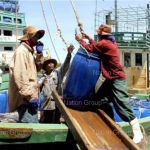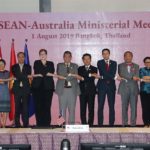
Tough enforcement by the Thai authorities, including the arrests of dozens of officials complicit in human trafficking and labor abuse, is producing positive results in the government’s campaign to clean up the country’s fishing and seafood industries and rid the supply chain of trafficking and abuse, Thailand’s ambassador to the United States told a major seafood industry gathering in Boston last week.
“The tide has been turned irreversibly against modern-day slavery and labor abuse in Thailand. Systematic and comprehensive reform has been in place to make changes sustainable. Under this fight, laws have been toughened, enforcement beefed up, shrimp sheds shut down, owners brought to court and victims looked after,’’ Ambassador Pisan Manawapat told participants at the Seafood Expo North America, one of the largest industry gatherings of the year.
Thai authorities arrested 91 people – including politicians, members of the military and police, bureaucrats and career criminals – who were involved or complicit in trafficking migrant ethnic Rohingya from Myanmar and Bangladesh, many of whom ended up on fishing ships as forced labor. Police also shut down a shrimp-peeling shed that was abusing migrant workers reported on by the Associated Press.
Responding to the revelations of abuse and trafficking in third party suppliers, the Thai private sector also took action, with companies such as Thai Union Foods and CP Seafood moving all operations in-house so such abuses will not take place.
“We recognize that there are serious problems in supply chains relating to human trafficking, labor abuse and illegal fishing. Thanks to the continuous efforts of several NGOs and serious journalists, some have been reported. We were shocked. We find it completely unacceptable,” Ambassador Pisan said during a well-attended session at the Expo entitled: Moving forward with sustainability: Latest updates on seafood supply chain reform in Thailand.
“The Thai Government from the highest level has shown resolve. We have achieved results. Yet we know much more will have to be done,’’ he added.
High-ranking officials from the Ministry of Labor, the Department of Fisheries and the newly established Command Center to Combat Illegal Fishing in Thailand flew to Boston from Bangkok to appear with Ambassador Pisan, explain the measures being taken and respond to questions.
John Connelly, President of National Fisheries Institute, said the coming together in Boston of this group of key people in charge of various aspects of the reforms reflected the seriousness the Thai Government in tackling these problems.
Among the reforms implemented by the Thai government have been establishing Port In/Port Out inspections at 28 locations, stepped-up inspections both in port and at sea, training of multi-disciplinary inspection teams, the mandatory installation of Vessel Monitoring Systems on all ships 60 tons or more. Other measures include the registration and regularization of over 147,000 illegal migrant workers in the fishing and seafood industries.
Thailand is implementing a comprehensive Fisheries Management Plan based on the maximum sustainable yields in the waters where its fleets commonly fish. The Plan places limits on types of equipment that can be used, and where and when ships can fish. A freeze on the licensing of new fishing vessels is in place and the authorities have revoked the licenses of over 8,000 fishing ships. Laws have been updated and strengthened and penalties for violators increased.
Media attention, however, has created the impression that Thailand is the global center of illegal, unregulated and unreported (IUU) fishing. The facts, however, do not support that misconception.
While Thailand acknowledges and is dealing with its IUU challenges, the World Ocean Review has reported that the situation is most serious off the coast of West Africa, where 40 percent of fish caught are through IUU. Thai vessels operate in parts of the central Pacific Ocean, along with those of many other countries whose vessels have been found committing IUU violations. That area ranks second with 34 percent. But the northwest Pacific around the Bering Sea comes in third with 33 percent, and Russian and Chinese fleets are mainly responsible, according to World Ocean Review.
In fact, the Gulf of Thailand and the Andaman Sea, where most Thai vessels operate, are not among the most heavily fished, according to a map produced by Skytruth for Global Fishing Watch. Nonetheless, Thai authorities agree that it is undeniable that those areas are overfished and stocks are declining, so new regulations are limiting fishing in those areas.
Ambassador Pisan pointed out that Thailand is working with organizations that have been among its sharpest critics – the Environmental Justice Foundation, the Labor Rights Promotion Network Foundation, the International Labor Organization and the International Organization for Migrations, among others – and has taken their findings and recommendations seriously.
Thailand wants to strengthen these partnerships because the country shares the goals of those organizations in striving to make its fishing and seafood industries safe, sustainable and free of trafficking and abuse.
The Ambassador said he is confident that Thailand will be able to accomplish that, and serve as a role model for cleaning up IUU fishing and trafficking in other regions where the organizations have cited similar or greater problems.




